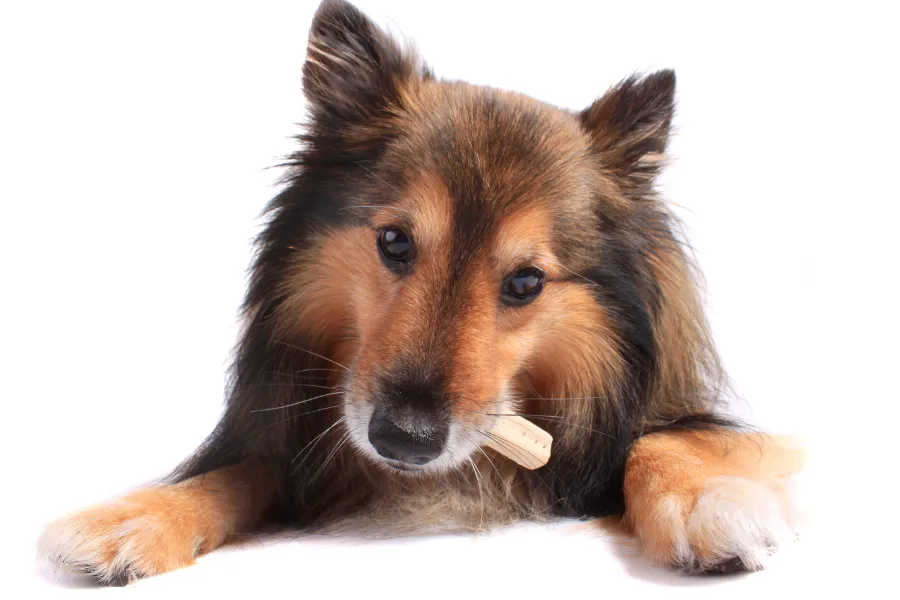Do you worry about whether can dogs eat Babybel cheese? If so, you must wonder if Babybel cheese is safe for your four-legged friend. This article will explore the potential risks and benefits of giving your dog Babybel cheese. So, whether you’ve already let Fido indulge or are considering it, keep reading to discover how this snack may affect your canine companion.
Ingredients in Babybel Cheese
Babybel cheese is made from pasteurized cow’s milk and contains healthy, natural ingredients such as salt, rennet, lactic acid, starter cultures, and coloring agents. The cheese has a soft texture, making it easy to break apart and chew. Many people enjoy snacking on Babybel cheese because it has a mild flavor and is low in fat, carbohydrates, and cholesterol.

Regarding nutrition and ingredients, Babybel cheese contains 17 percent fat, 2 grams of protein, and 4 grams carbohydrates per serving. Also included in the list of ingredients are calcium chloride and rennet, two dairy products designed to help shape the cheese and keep it from becoming too soft or crumbly. Both calcium chloride and rennet are safe for humans to eat but can cause some side effects if dogs consume them in large quantities.
Can Dogs Eat Babybel Cheese
When it comes to feeding your pup snacks, Babybel cheese is a great option. With some caveats, this popular and nutritious snack can be enjoyed by humans and dogs alike. While it’s generally safe for most dogs to have a small amount of unprocessed Babybel cheese, there are risks if the cheese contains additives like onion or garlic powder.
It’s important to remember that even when given in moderation, cheese should not make up a substantial portion of your dog’s diet.
So before you give Fido his next treat, let’s take a closer look at the risks and benefits associated with giving your pup Babybel cheese.
Nutritional Benefits of Babybel Cheese for Dogs
Babybel cheese is known for being packed with protein, calcium, and phosphorus – making it an excellent snack for your canine friend.
It contains high-quality protein for your puppy, which offers an array of benefits, including building muscle and increasing strength in their bones and joints.
In addition, it’s also packed with calcium, which helps protect against brittle bones and joint problems as dog’s age. Phosphorus is also abundant inside Babybel Cheese, which allows dogs to digest food more efficiently and strengthens their teeth.
Finally, sum up the nutritional profile of Babybel Cheese. This tasty snack provides all the essential vitamins and minerals that help keep your dog healthy, like Vitamin A, Vitamin D3, B12, and Niacin, which offer your pup numerous long-term health benefits.

Potential Health Risks of Feeding Babybel Cheese to Dogs
Despite its benefits, there are potential risks involved when feeding your dog Babybel cheese that must be considered. Dogs have more delicate digestive systems than humans, so eating large amounts of dairy can lead to gastrointestinal upset, such as diarrhea or vomiting.
Although Babybel cheese is highly appealing to many dogs due to its salty, savory taste, as a pet owner, you should be aware of the potential health risks of feeding your four-legged friend this type of cheesy snack.
In addition, this creamy snack is often somewhat sticky when initially removed from the foil wrapper and can get stuck between teeth if not properly chewed before swallowing. This could lead to dental issues if left unchecked.
Additionally, the string that wraps around the cheese outside could become a choking hazard or obstruct your pup’s airways if they try to consume it whole.
It’s also important not to feed low-fat varieties of Babybel cheese as they contain more sugar than the original due to added preservatives or sweeteners, which could contribute to obesity in pets over time if enjoyed too often.
Similarly, fat-free varieties may contain artificial substitutes that could cause health issues if consumed regularly over an extended period. Always check the ingredient label before offering any food item as an occasional treat for your treasured canine companion.
As with any other food item, you should always supervise your pup while they eat and carefully discard any wrappers or other packaging material after they’ve enjoyed their treat!
How Much Babybel Cheese Is Safe for Your Dog To Eat
When feeding your dog Babybel cheese, it’s important to remember that moderation is vital. Too much of any food can lead to digestive issues and other health concerns for your pet. A good rule of thumb when feeding treats to dogs is that they should only make up 10% or less of their daily calorie intake.
If you’re giving them one piece (or slice) of Babybel per day, you’ll need to adjust their regular meals accordingly so they don’t get too many calories from snacks alone.
It’s also important to consider the size and weight of your dog when determining how much Babybel Cheese is safe for them – smaller breeds may only require a small amount, while larger breeds could handle more without issue.
Babybel tastes excellent, and many dogs love it as an occasional snack – monitor their reactions carefully so you can adjust accordingly if needed!

Alternatives to Feeding Your Dog Babybel Cheese
So what are the alternatives to feeding your pup this type of cheese?
One alternative is to provide your dog with softer cheeses containing less lactose.
If you want to avoid going the dairy route, give your pup some veggies! Foods like carrots, sweet potatoes, or string beans have a better nutritional profile and can provide the same crunchy texture as a piece of Babybel cheese.
Additionally, many fruits are an excellent source of vitamins A & C while delivering an appropriate dose of sweetness. Ensure they don’t eat grapes or raisins, as those may cause adverse reactions in some dogs!
Other options include offering smaller doses (think pinch-sized portions) from a variety of human foods such as eggs, cooked lean meats, or plain popcorn mixed with olive oil & sea salt for flavor.
Remember that these snacks should not replace regular meals but offer small daily rewards when desired.
Ultimately, it’s essential to encourage healthy eating by providing your pup with fresh ingredients whenever possible while avoiding artificial additives like preservatives and sugars that could put their health at risk over time.
Always consult your veterinarian before introducing new foods into your pet’s diet.
Final Thoughts on Can Dogs Eat Babybel Cheese
Before feeding Babybel cheese to your pet, it’s essential to consider the risks and benefits. While it’s low in fat and sodium, there are still potential issues that need to be considered.
It is also essential to remember that foods like Babybel cheese are not a healthy part of a balanced dog diet.
While small pieces here and there are generally safe in moderation, they should never be regularly given as a treat or meal replacement.

